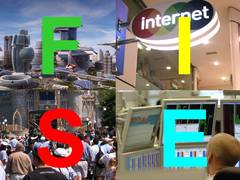SmoothIT participates in FISE session during the FIA meeting in Madrid
Following the successful socio-economics panel which was held in conjunction with the first Future Internet Conference in Bled in April 2008, the aim of this FISE session was to discuss the challenges related to socio-economic issues in the Future Internet in order to gain new insights and perspectives on how a possible research agenda and integration path towards the Future Internet could look like. In preparation for the session a position paper [1] was written, integrating the different viewpoints of all the contributors.
Socio-economics aims to understand the interplay between the society, economy, markets, institutions, self-interest, and moral commitments. It is a multi-disciplinary field using methods from economics, psychology, sociology, history, and even anthropology. Socio-economics of networks have been studied for over 30 years, but mostly in the context of social networks instead of the underlying communication networks.
The objective of the FISE session in Madrid was to tackle socio-economic questions related to networks, services, and content in the Future Internet. Topics of interest which were addressed in the session included pricing, value chains, and business models as well as network neutrality, bandwidth markets, regulation, and governance issues. Moreover, user identity and privacy, as well as trust and reputation questions were tackled. Furthermore, the session addressed topics like peer-to-peer content distribution models, customer usage behaviour and customization, as well as creative commons. Finally, the vision of a universal Internet service was discussed.
The FISE session program included a keynote and a panel which was followed by a long discussion session. After the introduction by the session chairs, Costas Courcoubetis (AUEB) gave a keynote on Socioeconomic Issues in the Internet of the Future, which raised an interesting discussion on the need for incentives in the Future Internet. Following the keynote, the socio-economics panel was moderated by David Hausheer and included short position statements from Pekka Nikander, Malte Behrmann (GAME), Vincenzo Fogliati, Klaus Wuenstel (Alcatel-Lucent), and Mike Boniface (IT Innovation).
Based on the experience in Bled, it was decided to allocate the rest and major part of the time for discussion. This part of the session was moderated by Pekka Nikander and started with a group brainstorming by Esa Saarinen and Kirsti Lonka. This brainstorming addressed the question how the dream research agenda for Future Internet Socio-Economics should look like. In was organized in 6 steps, where participants had to share summaries of their findings in groups which doubled in size after every step. Finally, the results of all groups were presented to the plenary. Those answers can be found on the FISE Wiki [2] together with all other material of the session.
The group brainstorming was followed by a discussion which concluded the session. The discussion is likely going to continue on the FISE Wiki and will be followed-up at the next Future Internet Conference which is going to take place in May 2009 in Prague.
[1] David Hausheer, Pekka Nikander, Vincenzo Fogliati, et al.: Future Internet Socio-Economics - Challenges and Perspectives, Position Paper, November 2008, Available at http://www.smoothit.org/wiki/uploads/FISE/FISE_position_paper_final.pdf
[2] Future Internet Socio-Economics (FISE) Working Group, Available at http://www.smoothit.org/wiki/pmwiki.php/FISE, Last accessed December 2008.


